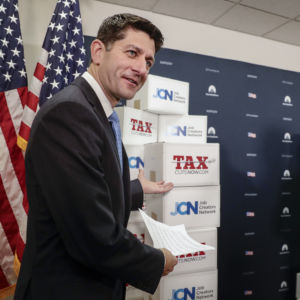The nation’s 30 million small businesses create about half of all private sector jobs. We led the way out of the Great Recession by creating two-thirds of all America’s private sector jobs since 2008. We are part of the fabric of what makes our local communities great places to live and raise families.
And we are always at the very top of polling showing that the public respects and has confidence in small businesses more than any other American institution.
So, it is good that every year since 1963 the president signs a proclamation recognizing National Small Business Week, which is going on now.
However, it would be better if the federal government’s appreciation of small businesses was demonstrated in policy in addition to public recognition. There is no better example of how Washington talks a good game about small businesses while failing us than the very recent tax reform that was enacted this past December.
Small businesses supported reforming the federal tax code to make it simpler to understand and file returns, significantly reduce our taxes so that we could invest in growing our businesses, put more money in the pockets of working Americans to increase Main Street consumer demand and put small businesses on a level, competitive playing field with big corporations.
Not only were none of these goals met, the new tax law made matters worse for small businesses in comparison to the benefits given to big and multinational corporations.
Corporations received $1 trillion of the tax law’s $1.4 trillion benefits in a very uncomplicated and permanent 40 percent tax rate cut. Most of their savings have gone toward stock buybacks to increase artificially the value of their stocks to benefit shareholders and corporate executives. Very little of the corporate tax savings have gone to the workers.
As an example, the Fifth Third Bank in Ohio announced that it would pass on only $48 million of its more than $3 billion tax savings to workers, using the rest for stock buybacks. Corporations using their windfall in this way has resulted in only 32 percent of workers reporting that they have seen some increase in take-home pay and 62 percent of these workers say that the extra money has helped “some,” “just a little” or “does not help much at all.”
As for small businesses, 90 percent of which are not corporations, we received something called a deduction on our taxable income that will end in 2025. According to a just released report by Congress’s Joint Committee on Taxation, the average small business will receive only about $400 in tax benefits for the deduction.
A poll recently released by Businesses for Responsible Tax Reform found the vast majority of small business owners don’t believe the tax law will help grow their business. In fact, 69 percent of the plurality Republican survey said the tax law will not allow them to hire new employees or give raises.
Furthermore, the new tax law is so complex and convoluted for small businesses that CPAs are struggling to understand it to advise clients. The IRS acknowledges that it will take months fully to write the rules about how the new code should be applied and even which small businesses qualify for benefits and how much.
Two recent surveys illustrate these concerns by small businesses.
The National Association for the Self-Employed found almost 60 percent of respondents felt their taxes would be more difficult to complete in 2018 because of the new tax law and 83 percent did not have a complete understanding of the impact the new tax reform law would have on their business.
According to the National Small Business Association, 68 percent of small business owners said that the complexity of filing their taxes would increase or stay as complicated as before.
Clearly Congress should revisit their tax law and put small businesses as their priority to grow our economy by helping small businesses grow. It should begin this process now during National Small Business Week.

